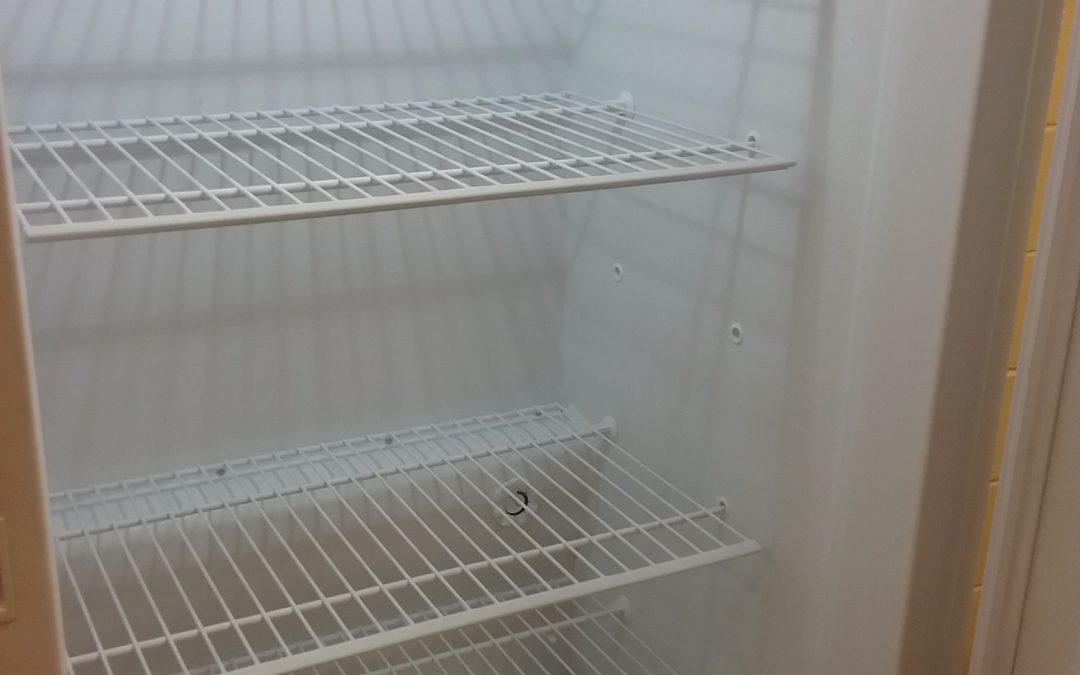
by Judy Corbus | Nov 23, 2019

Flour is considered a raw ingredient so bake before eating. Photo credit: Judy Corbus
There is something about cooler weather that brings out the urge to bake and fill my home with delightful aromas befitting the season. Enjoying the fruits of my labor is a tasty experience but here are 8 tips I follow during prep and afterwards to keep my baked goods safe.
- Wash my hands, baking tools, appliances, and work surfaces with soap and hot water before, during, and after food prep – clean as I go!
- Break eggs in a separate bowl before adding to the batter. This keeps shell fragments out of the batter and, if the egg is spoiled, I don’t ruin the whole project.
- Never eat unbaked flour – this includes dough and batter. Flour is considered a raw ingredient, as it is minimally processed before being packaged for use. Wheat stalks in the field come in contact with birds, rodents, and other bacteria sources, which can spread E. Coli. Raw eggs can contain salmonella so bake foods to the proper internal temperature and resist the urge to lick the bowl, spoons, and beaters.
- Use a food thermometer to check internal temperatures – a brown crust does not equal doneness. Insert the probe food thermometer in the product center and wait for the temperature to maintain a level reading. This Baked Goods Internal Temperatures Chart is a handy guide for determining internal doneness. If the outside is browned but it’s not done in the middle, lay foil lightly over the crust to prevent overbrowning and continue baking until the proper internal temperature is reached.
- Always refrigerate perishable ingredients, pies, cheese-filled breads or baked goods with perishable filling ingredients (this includes eggs, custards, cheese, pizza, meats, casseroles, cream pies, puddings, and crème puffs) within 2 hours of use, preparation, or serving at room temperature. Cookie, scone, biscuit, pie, and yeasted dough may be refrigerated or frozen for later use.
- Cool baked products on clean wire cooling racks on a clean counter or table away from where raw batter or dough are prepared. Don’t cool in the baking pans or directly on counter tops.
- Wash my hands before packaging cooled products.
- Store plain yeast breads at room temperature no longer than 1 to 2 days; freeze for longer term storage. Do not refrigerate unless the bread is filled with perishable ingredients.
Enjoy your favorite baked treats safely this holiday season and beyond!
Sources: Home Baking Food Safety 101
HomeBaking.org
What’s Cooking America
North American Millers Association

by Judy Corbus | Jul 5, 2019

Visit places close to home for a vacation that won’t break the budget. (Photo source: UF/IFAS)
“Summer” and “vacation” seem to go hand-in-hand, as school is out and schedules are a little more laid back. Now that summer is here, you may be making plans for a getaway to your favorite spot. Perhaps, you are saving up for that dream trip next summer but you’d still like to take a break and have some fun this year. How can your family and you enjoy yourselves without breaking the bank? The answer might be right in your own backyard!
- Plan a staycation. Rather than traveling out of the area, use your home as base and plan some fun activities – family game time, camping out in the backyard and making s’mores, or running through the sprinklers and having a water balloon fight. Or just relax with a good book and a glass of lemonade or catch a few zzzs under a tree. The key is to turn off the devices, forget about work, and not worry about projects around the house – they will be there after you “return.”
- Plan day trips. These can be a part of your staycation, too. If you live fairly close to the beach, pack the car and head out early to enjoy the surf before temperatures rise. Make a day of it by enjoying the sunset before heading home. State parks also offer hiking and biking trails, boating and canoeing, swimming, playgrounds, picnic areas, and other fun activities. Florida boasts of 175 state parks, trails, and historic sites around the state so your next adventure may be just a short drive away. Check out https://www.floridastateparks.org/ for a park near you.
- Check out local events. Libraries and museums often feature special exhibits for free or a nominal charge. Several years ago, I visited a traveling exhibit about the Titanic at an arts center an easy drive from home. It made for an enjoyable and educational afternoon! Contact your local library or museum for a schedule of summer program offerings.
- Take part in a service project. A number of families are opting to use some of their vacation time to help others in need in their communities – projects include yard work, painting, basic home repairs, assisting with a food pantry/clothes closet, and serving meals to the homeless. These projects may be sponsored by a community service organization or church. During this past spring, local media outlets reported on several groups of college students representing campus ministries, fraternities, and other organizations who volunteered their Spring Break time to assist with Hurricane Michael clean-up and recovery. Participating in a service project as a family can be a meaningful way to give back to the community and make a difference locally. Contact your place of worship or local service organizations for opportunities in your area.
This summer, “recharge” without a super charge to your wallet!
Source: https://www.daveramsey.com/blog/i-need-a-staycation

by Judy Corbus | Mar 22, 2019

Unexpected expenses? Be prepared with a “rainy day” fund. Photo credit: UF/IFAS Northwest District
It began as a normal six-month dental check-up – no pain, no problems. After the X-rays, cleaning, and exam, my dentist informed me the X-ray showed an abscess above a back molar. The next thing I knew, I was headed to the endodontist for a root canal then back to my dentist for a permanent filling – wow! Who saw that coming? That was a classic “Life happens” moment!
We all face those unexpected events – a flat tire, a faulty alternator, an appliance on the fritz, a medical emergency. The question is, do we have the funds available to cover it? An emergency, or “rainy day,” fund helps us to handle those surprise expenses more easily, reducing our need to borrow to pay for them.
How much should we have in our emergency fund? A minimum of $1000 is a good starting point – that typically will cover most emergencies. A fully funded emergency reserve is three to six months of expenses; some financial advisors recommend eight to 12 months of expenses. If you are the sole breadwinner in your household, funding it to six months or beyond gives you a greater cushion. What is significant about these numbers? If you were unable to work due to a job loss, layoff/furlough, illness, or a family emergency, you would have funds available to tide you over until you could get back on your feet. Having funds to keep you afloat for a few months removes a lot of pressure and may allow you to explore your options without feeling like you need to take the first job offer that comes along because you “need the money.”
How do you fund your emergency fund? Look at your finances and, if you aren’t already in the habit of doing so, set aside a portion of your paycheck for savings right off the top – pay yourself first! Even if it’s just a few dollars per paycheck, those dollars will add up. If you receive a pay raise, save the difference between the new amount and your pre-raise salary. Your income tax refund is another great way to jump start your emergency fund – use Form 8888 Allocation of Refund to direct deposit your refund into one or more accounts.
It is a fact of life that life happens – be prepared with an emergency fund!
For more information on saving for emergencies, please see UF/IFAS FCS 7014 Money and Marriage: Saving for Future Use.

by Judy Corbus | Dec 3, 2018

Photo source: UF/IFAS Northwest District
The holiday season is here and, with it, many colorful decorations, delicious treats, and fun events. There also are hidden dangers that can mar this special time of year if we aren’t careful. Follow these twelve tips for a safe holiday celebration:
- To reduce fire risk, do not connect more than three strings of incandescent lights. Follow label guidelines for stringing together LED lights. Check lights for frayed or exposed wires, loose connections, and broken sockets and replace as needed.
- Place candles on stable surfaces away from trees, curtains, and other flammable items and out of reach of children. Never leave burning candles unattended or sleep in a room with a lit candle. Consider using battery-operated candles.
- Use caution when decorating with “angel hair” and artificial snow. Angel hair is made from spun glass and can irritate eyes and skin; always wear gloves when handling or use non-flammable cotton instead. Artificial snow can irritate your lungs if inhaled; follow package directions carefully.
- Keep kids and pets in mind when decorating the tree. Place breakable ornaments or ones with metal hooks near the top out of reach of little hands, playful paws, and wagging tails.
- Use a sturdy step ladder, not chairs or other furniture, to reach high places. Get someone to “spot” you and assist with handing or taking items.
- If you use a fireplace, have your chimney checked and cleaned at least once a year by a certified chimney sweep. Cleaning removes soot and other by-products that can lead to chimney fires and carbon monoxide intrusion into your living space.
- Use special care when giving toys that use coin lithium batteries to children. Older children’s devices with these batteries can be enticing to young children. Ingestion of button batteries can cause serious injury or death. Lock away spare batteries and closely supervise young children around products with button batteries. In case of ingestion, contact the 24-hour National Battery Ingestion Hotline, (800) 498-8666.
- If you want to fry a turkey, consider using an oil-less turkey fryer or purchase a fried turkey from a professional establishment. The Consumer Product Safety Commission reports that since 2002, there have been 168 turkey-related fires, burns, explosions, or carbon monoxide poisoning incidents, 672 injuries, and $8 million in property damage. Don’t add to the statistic count!
- Use a food thermometer to ensure meat reaches a safe internal temperature. Click here for a convenient temperature chart.
- Refrigerate food within two hours. Cut leftover meat in small pieces and store foods in shallow containers so they will chill quickly. Use leftovers within four days or freeze or discard.
- Reheat sauces, soups, and gravies to a rolling boil before serving.
- Wash your hands frequently with soap and warm water to reduce your risk of illness.
Have a happy, healthy holiday season!
Sources:
National Safety Council
Chimney Safety Institute of America
Electrical Safety Foundation International

by Judy Corbus | Nov 15, 2018

Photo source: UF/IFAS Northwest District
After an extended power outage, your refrigerator and freezer may develop unpleasant odors from spoiled food. To get rid of these odors, remove all food items and clean the inside, including drawers and bins, with a mild cleaning solution of dish soap and water. You also can use a solution of 2 tablespoons baking soda and 4 cups warm water. Strong cleansers may affect the taste of food or ice cubes or damage the interior finish. Rinse with a bleach solution of one tablespoon unscented chlorine bleach per gallon of water to sanitize. Lemon juice and water solutions are not strong enough to sanitize effectively. Leave the unit unplugged with the door open for 1-2 days to air out. Spray disinfectant around hinges, locks, and into any openings.
If odors persist, try one of these methods:
- Spread activated charcoal, clean cat litter, or baking soda on trays and place on refrigerator or freezer shelves. Activated charcoal is extra dry and absorbs odors more quickly than cooking-type charcoal. It is available at drug or pet supply stores. Run the appliance empty for 2-3 days. If the odor remains, replace with new charcoal and repeat.
- Place trays of freshly ground coffee on appliance shelves and close the door. Run the appliance empty for 2-3 days. If a slight coffee aroma remains, wash and rinse shelves and the aroma should dissipate.
- Pack each shelf with crumpled newspaper. Set a cup of water on the top shelf or sprinkle the newspaper with water. Allow appliance to run for approximately 5-6 days. While this method is time-consuming, it is effective in removing strong odors.
- Use a commercial product designed for refrigerator and freezer odor removal. These products are available at hardware, grocery, discount, and variety stores.
Once the odor is gone, rinse and dry the appliance. Don’t forget to clean gaskets with a mild cleaning solution and warm water; rinse and dry. Dirt and spills can prevent the gasket from sealing well, resulting in a loss of cold air and higher utility bills. Also, clean the coils and front grill with a brush or vacuum cleaner to remove dirt that can hinder air flow to the condenser.
Use an appliance thermometer to check the temperature of your refrigerator and freezer. The refrigerator should be between 33˚F and 40˚F and the freezer at 0 degrees or below.
If there is still an odor after trying these steps, it is possible meat or fish drippings have seeped into the insulation. An appliance service technician may need to remove the liner and replace the insulation or the appliance may need to be replaced.
Sources:
My Florida Home Book – University of Florida/IFAS Extension
Solving Odor Problems in Your Refrigerator or Freezer – University of Nebraska-Lincoln Cooperative Extension
When the Power Goes Off – Clemson Cooperative Extension
Cleaning the Fridge – North Carolina State University Cooperative Extension










